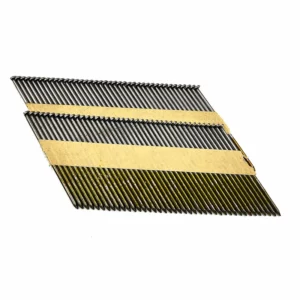In the construction industry, plastic collated nails are generally more commonly used compared to paper collated nails.
There are a few reasons for this:
Durability: Plastic collated nails are known for their durability and resistance to damage. The plastic strips provide better support and protection for the nails during transportation and use, reducing the risk of nail breakage or strip failure.
Moisture Resistance: Construction sites often involve exposure to various weather conditions, including rain or high humidity. Plastic collated nails offer better moisture resistance compared to paper collated nails, making them more suitable for outdoor applications.
Reduced Jamming: Plastic collated nails have a lower tendency to jam in nail guns compared to paper collated nails. The plastic strips provide smoother and more consistent feeding, minimizing interruptions and improving productivity on construction sites.
Compatibility: Many modern nail guns are designed to work with plastic collated nails. Contractors and construction professionals often prefer the convenience of using plastic collated nails with their existing nail gun models.
While plastic collated nails are more commonly used, it’s important to note that the choice between paper and plastic collation ultimately depends on the specific needs and preferences of the project, as well as the compatibility with the nail gun being used. Some applications may still utilize paper collated nails, particularly in cases where cost considerations or environmental concerns are prioritized.
What are some common applications where paper collated nails are still preferred?
While plastic collated nails are more commonly used in the construction industry, there are still some applications where paper collated nails are preferred.
Here are a few examples:
Indoor Finishing Work: Paper collated nails are often used in indoor finishing work, such as trim carpentry, paper vs plastic collated nails cabinetry, and woodworking projects. The smaller gauge nails commonly used for these applications are often available in paper collation. The biodegradable paper strips are less likely to leave behind marks or residue on delicate surfaces, making them suitable for visible finishing work.
Flooring Installation: In certain flooring applications, such as hardwood flooring installation, paper collated nails are commonly used. The smaller size nails and the ability to blend in with the wood surface are key factors in this preference.
Furniture Manufacturing: Paper collated nails are preferred in furniture manufacturing, especially for assembling wooden frames, attaching upholstery, or securing components. The smaller nail sizes commonly used in furniture assembly are often available in paper collation.
Specialty Applications: Some specialized applications may require paper collated nails due to specific requirements or regulations. For example, in certain historical restoration projects or heritage sites, paper collated nails may be preferred to maintain authenticity or comply with preservation guidelines.
Environmental Considerations: In cases where environmental concerns are a priority, some contractors or builders may opt for paper collated nails due to their biodegradability and recyclability. This choice aligns with sustainability goals or specific project requirements.
It’s important to note that the availability of paper collated nails in various sizes and types may vary depending on the region and supplier. Contractors and construction professionals should assess the specific needs of their projects and consult with nail manufacturers or suppliers to determine the appropriate collation type for their applications.
